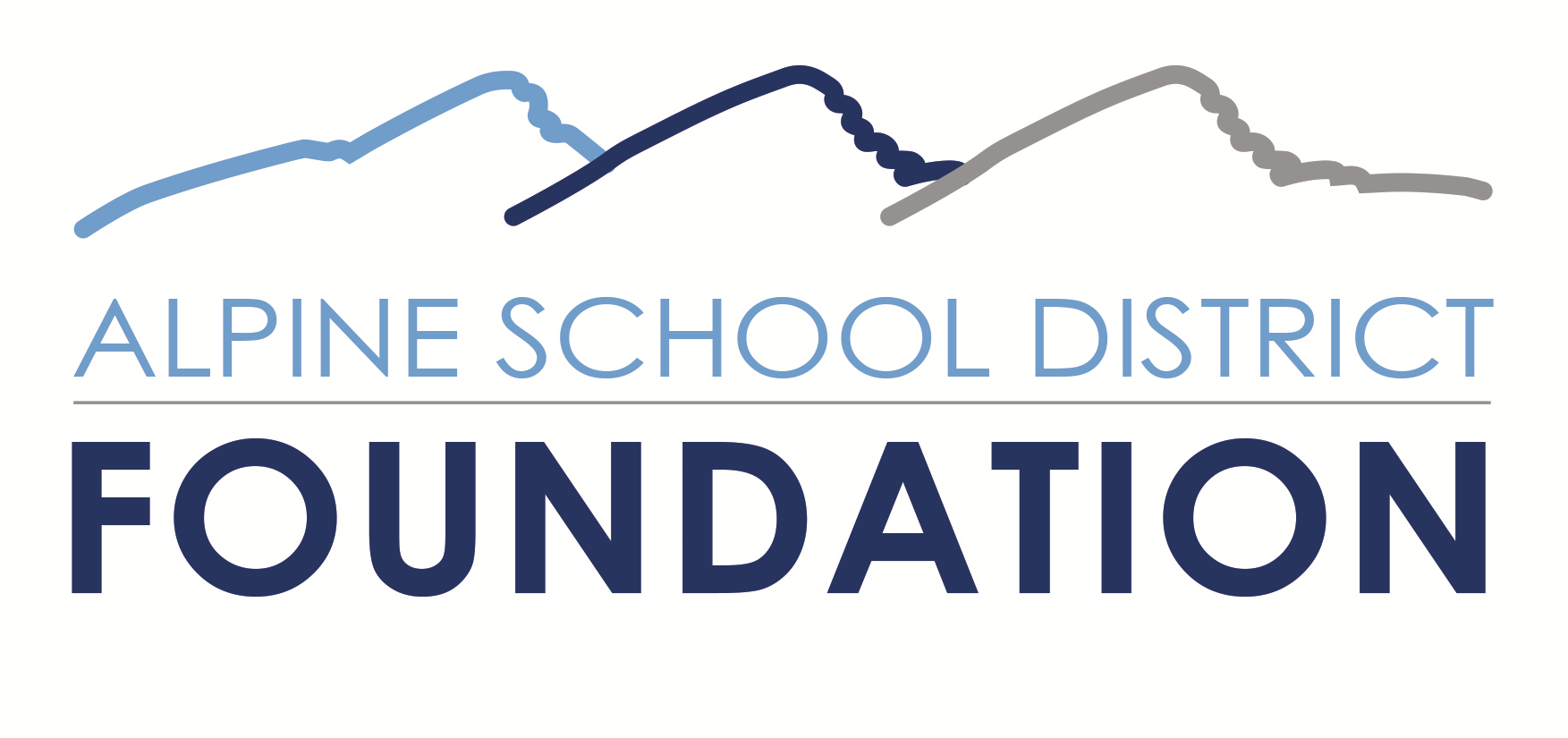Fundraising Resources
We are here to help you!

There are countless ways to fundraise, and let’s face it, some are better than others. The Alpine School District Foundation is here to help you figure out the best fundraising activities for you and your community.
Don’t hesitate to call us to discuss your ideas or any of the
many ideas on this page (801) 610-8425.
#1 NO-FUSS Fundraising
You don’t need to “sell” anything!
When you are doing INSPIRING STUFF, people will give if you
1. educate them
2. invite them to help you.
Our #1 recommendation for fundraising is a “no-fuss” fundraiser,
without any goods, products, or services being sold. This method
generally both raises AND nets more money for your cause. (And let’s
face it, they still have the frozen cookie dough in the freezer from the
last time…)
No Fuss Fundraising means making a plan to tell folks what you are
doing and why it matters and then inviting them to support it.
You can do this in part by highlighting the difference between what you
are asking them to do and what a traditional fundraising sale would do.
“In years past, we sold XXX for $20, but only $10 went to our program.
We decided this year we would just ask you for the $10 that was going
to our program or to give any amount you would like to help us reach
our goal and be able to….”
#2 Tie Your Fundraising to Educational Initiatives
Parents, grandparents, aunts, uncles, cousins, neighbors, and friends
would rather support your students in their education then in any thing
else.
That’s why we encourage you to consider fundraising activities that tie
directly to educational objectives you have in the classroom or school
Choose one of the following ideas and have students collect pledges of
support:
Read-a-thon: students read so many pages, books, or minutes/hours
and collect pledges to support their reading. Make it a classroom,
grade level, or school-wide event and celebrate reading while
collecting funds to support your cause.
Math-a-thon: dedicate time to achieving math success or focusing on
having student successful solve math equations with pledges to
support them.
Walk-a-thon: Get healthy and collect pledges for laps. Incentive the
kids and families and get volunteers involved to make it a special day
at the school.
STEM Fair/Science Fair: Ask for sponsors or donations in conjunction
with these events that support core curriculum.
Art Shows: Get everybody gussied up for an elegant evening of
strolling the pop-up art gallery in the school gym, cafeteria, or
hallways. When there is no entry fee required, but an invitation to
give instead, your folks may surprise you with how generous they
become. Allow patrons to “vote” with dollar bills on their favorite
pieces of art or perhaps they can donate in order to take the artwork
home with them.
Get Sponsors: Sponsors are not necessarily donors as they may want
their advertising out there for folks to see, but when sponsors are
willing to give larger amounts to support your programs, you can
make more money faster
Selling Ads/Banners: Banner and ad sales can bring some great
revenue to your programs, but please remember that in these cases
your supporters are purchasing ads and these should not be treated
as charitable contributions.
Carnival: When you have the volunteer and community support, you
can raise a nice amount of money by hosting a fair or carnival on the
school grounds. It takes a lot of work, but when you make it exciting,
you get folks out to support you and have fun.
Auctions: Auctions can also be a ton of work, and the key is in the
volunteer support and in getting items donated for the auction. If
your parents and volunteers are willing to put in the work and you
can get the items donated, you again can raise some real money
here.
Golf Tournaments: The key to a successful golf tournament fundraiser
is getting great sponsors who help. These are really fun for golfers
and take a fair amount of work and planning. If you have a history of
getting the sponsors and the public support, then keep that
momentum going. If you haven’t tried it yet, you might consider less
costly and labor-intensive ways of raising the same money.
There are Many FREE Resources at Your Disposal
- Use the Foundation: Using the Alpine School District Foundation, is the simple and easy way to give your donors the option to make a tax-deductible contribution and get the funds they want to share with you into a Foundation account you can easily access… and it’s FREE! When your donors use the electronic giving option available to your school, they can choose to cover the transaction fees themselves, meaning more money coming to your program!
- Avoid Expensive Vendors: Lots of companies out there tell you how great they are at promoting your campaign, but we believe that no one is better than YOU at promoting your campaign.
- Tap Into Your Networks: Use the relevant social media accounts for your school or program, have those involved do the same with their channels, and use text and email where appropriate and where you have that information already.
- Remember it is your relationships that lead to gifts, not some expensive technology or something you are selling.
Approved Fundraising Partners
DonorsChoose: DonorsChoose is a great way to leverage when a teacher needs supplies for the classroom, as many donors outside of your network, including large companies, support these projects. The Foundation will even use DonorsChoose in some granting opportunities.
Facebook Fundraiser: Is an easy online fundraising, but be sure to read the pros and cons before you decide.
Selling Stuff: If you’ve read through our Best Fundraising Ideas, you’ll note we encourage you to educate and invite your community to support you without sales or gimmicks.
*However, if you want to continue to do selling for fundraisers, we encourage you to find the best value for your efforts. Remember, many vendors set a minimum sales threshold to give their best deal on profit. And many won’t ever give you over 50% of the proceeds, so choose wisely!
District Fundraising Policy
Statement of Policy
The Board of Education maintains the position that public education is free and should be supported through revenues derived from statutory school finance code and not by means of student and school fundraising projects. In its application, this philosophy holds that all basic educational programs shall receive the necessary financial support through district allocations.
Student participation in extracurricular activities (such as athletics and clubs) is an individual choice. Extracurricular programs shall be supported through individual student participation fees and through group or individual fundraising where necessary.
Given these premises, the Board of Education maintains that public fundraising projects have only a nominal role in the operation of public education and should be restricted.
- DEFINITIONS
Definitions applicable to this policy are intended to be consistent with Utah Administrative Code R277-407-2 | Definitions.
1.1. “Fundraiser,” “fundraising,” or “fundraising activity” means an activity or event
provided, sponsored, or supported by a school to generate funds to:
1.1.1. provide financial support to a school or any of the school’s classes, groups, teams, or
programs; or
1.1.2. benefit a particular charity or for other charitable purposes.
1.1.3. include the sale of goods or services; the solicitation of monetary contributions from
individuals or businesses; or other lawful means or methods to generate funds for
student programs.
1.2. “Group fundraiser” or “group fundraising” means a fundraising activity where the money
raised is used for the benefit of the group, team, or organization.
1.3. “Individual fundraiser” or “individual fundraising” means a fundraising activity
where money is raised by each individual student to pay the individual student’s fees.
Board Approvals
- Board Approved: June 1984; Revised: June 2005, June 2013, March 2020
Procedures
1.1. All fundraising projects shall be instituted for definite, predetermined and budgeted
purposes which are in harmony with board philosophy and adopted policies. Funds
must be deposited into the school’s bank account, recorded in the District’s school
accounting system, and expended in accordance with the District’s purchasing
procedures.
1.2. Prior to being instituted, all fundraising projects shall have the expressed consent of
the principal.
1.3. Whenever possible, fundraising should be limited to the school’s attendance area.
1.4. Fundraising activities shall not market commercial products or participate in national
or regional fundraising schemes unless those projects are approved by the
Superintendent or his designee.
1.5. The principals in each cluster shall coordinate school program fundraising
activities in each community.
1.6. A school may not authorize, establish, or allow for required individual fundraising.
1.7. A school may provide optional individual fundraising opportunities for students to
raise money to offset the cost of the student’s fees.
1.8. A school may allow for required group fundraisers.
1.8.1. A school must notify parents of required group fundraising before the actual
fundraiser.
1.8.1.1. Prior notification of required group fundraising must provide parents and students with the following information:
1.8.1.1.1. A description of the required group fundraiser;
1.8.1.1.2. The estimated participation time required of the student or parent;
and
1.8.1.1.3. The consequences for non-participation in a required group
fundraiser.
1.8.1.1.3.1. Consequences for non-participation in a required group
fundraiser should be flexible in order to accommodate for
extenuating circumstances.
1.9. A school shall not deny student membership on a team or group, based on the student’s
non-participation in a required group or optional individual fundraiser.
1.10. All fundraisers shall comply with Utah Administrative Code R277-113 and R277-407, as
well as the District’s fiscal policies and procedures found in the ASD Financial
Accounting Handbook and Procedures for Advisors and Coaches of Extracurricular
(PACE).
2. SCHOOL LEVEL GUIDELINES FOR SEPARATE LEVELS OF PUBLIC EDUCATION
2.1. Elementary School
2.1.1. At the elementary level, Only one major fundraiser may be held each year. (Major
fundraiser is defined as that project which affects more than 50% of the students.) No elementary student shall solicit funds door-to-door.
2.1.2. Individual classes may not hold a public fundraising project.
2.2. Junior High/Middle School
2.2.1. At the junior high level, Only one major fundraiser may be held each year. Students at
this level may solicit door-to-door, but in the attendance area only. In addition, one
department or extracurricular program may sponsor a fundraiser each year, on an
alternating basis. No door-to-door soliciting shall take place for the departmental
fundraiser.
2.3. High School
2.3.1. At the senior high level, Only one major fundraiser may be held each year. Students
may solicit door-to-door in school attendance area. Each department or
extracurricular program may hold two fundraising projects at the discretion of the
principal. The written consent of the principal will be required for any additional
extracurricular or departmental fundraising projects.
Rules & Regulations
No rules & regulations have been established at this time.
For your convenience, you can find the
Alpine School District Fundraising Policy here.

